Motions On Rent Strike Under Study By Judge

- r After receiving a series of motions from both landlords' and tenants' counsel in case stemming from the local rent strike, Circuit Court Judge William F. Ager Jr. took them all under advisement yesterday and set a June 13 deadline for receipt of new briefs. Ager said the deadline at 2 p.m., would not be a hearing but the latest time at which counsel could present new memoranda. Ager stated a decisión would be rendered within a "very short time after that" deadline. In the three-hour morning session Ager heard arguments on a motion brought by William D. Barense, attorney for the seven plaintiff landlords. rense moved íor a summary judgment on the suit, claiming that the Tenants Right Act of Michigan requires withheld rent be placed in an escrow fund operated by an "enforcing agency." Barense also stated that the third party (the Tenants Union) was engaged in civil conspiracy which interferes with legal contracts. Barense also asked the court to enjoin further solicitation and collection of withheld rent, to order an accounting of the Tenants' Union escrow fund in a Canadian bank, and order the TU to surrender its funds to the court. James Lafferty of Detroit, attorney for the defendant tenants, replied that the Tenants Rights Act does not require that escrow funds be administered by an "enforcing agency." Lafferty said that Barense's motion for a summary judgment was unclear, and did not specify whether a partial or complete summary judgment was being requested. Lafferty said significant questions of fact remain to be decided, and that the injunction to prohibit further solicitation, organizing, or speeches would constitute prior restraint of granted and would henee viólate the First Amendment. In response to Barense's statement that the Tenants' Union was interfering with legal contracts, Lafferty said that housing code violations void lease agreements and that the interference charge was dependent on questions of fact which had yet to be determined. Lafferty also said that the restraining injunction was dependent on the plaintiffs showing that irreparable harm would result if it was not granted, and said that such harm had not been shown. He added the TU would show its accounts whenever the landlords were ready to open their books. In the hour and a half long afternoon session Lafferty moved for a summary dismissal of the suit on several grounds. He said the plaintiffs' motion for summary judgment was unclear as to whether it requested a partial or complete summary judgment, and repeated his o b j e c t i o n s to Barense's motions. Lafferty said he shouldn't make a summary judgment proposal until Barense had replied to his objections to the earlier Barense motion for a summary judgment. Underneath a welter of legal comments, the dispute hinges on two points of law: whether the Tenants Rights Act requires escrow funds to be administered by enforcing agencies, and whether the Tenants Union is- in legal terms- a third party interfering with valid business contracts. Of lesser importance but significant are the questions raised by the landlords' libel charges. Lafferty said that no case had been made and the publication was not identified. Also considered interesting is Lafferty's motion for permissive intervention, by which the court would order that restraining injunctions would not apply to the Student Government Council. Lafferty's position is that the SGC- some of whose members are not even tenants- represents students and other University people and is entitled to speak out and otherwise particípate legally in issues which concern students. Barense holds that any legal status held by the SGC- and he says its status has not been demonstrated to the court - is granted by the Regents or through bylaws. Henee Lafferty's statement that the SGC can sue or be sued is at variance with the Michigan state constitution, B árense states. Barense also said that Lafferty's motion for summary dismissal was in the nature of an affirmative d e f e n s e and henee not suitable as a cause for action by the court. The Tenants Union principal goal remains recognition for collective bargaining "because the other things they teil me they want can't be won without it," Lafferty said. He added that in saying they want complaints promptly dealt with, they include code violations.
Article
Subjects
Ann Arbor News
Old News